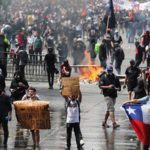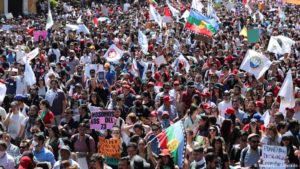A Growing National Strike Against Neoliberalism in Chile


Chile has exploded in social protests for the past several days, initially ignited by an increase in the metro fare. The initial protests developed into a national strike, even though conservative President Sebastián Piñera rescinded the four percent increase in subway fares last Saturday and vowed to forge a “new social contract” on Monday. What began as a student-led strike against a metro fare hike from 800 to 830 pesos ($1.13 to $1.17) has quickly spread to the larger population, which includes dockworkers, miners, other union members, and various social organizations. With the demonstrations growing, accompanied by looting, and violence on Saturday night Piñera declared a state of emergency for Santiago, deploying the military to the streets and establishing a curfew, which was extended throughout the country on Sunday. The official death toll has now reached 18 people, with political repression not seen since the days of the military dictatorship of Augusto Pinochet.
The current protests did not come out of thin air, but follow a decade of social movements focused on addressing growing economic inequality, an inadequate private healthcare and pension system, an unaffordable and inaccessible educational system, and a 45 hour work week (On the average, Chileans work about 300 more hours than the typical worker in the United States) Although Chile is held up as a model of development for the global South it has failed to make the transition from the production of raw materials to finished commodities as growth is still dependent upon the price of copper. In recent years, Chile has experienced economic growth based upon a global commodity boom—to a large extent driven by the Chinese economy— however during this period the richest 20 percent of society still received 58 percent of the national income, compared to 4 percent for the bottom 20 percent.
This has been the reality since the so-called “return to democracy” in 1990, an elite managed transition of democratization that was restricted to the political sphere, leaving intact the neoliberal socio-economic sphere engineered by the Pinochet regime. This process was not unique to Chile, but implemented all throughout Latin America in the 1970s and 1980s as a means to reconstitute bourgeois hegemony by transitioning the mode of political domination from coercive control exercised by exhausted and illegitimate authoritarian regimes to a more consensus-seeking electoral order.
During the period from 1990-2010 Chile was led by Concertación (meaning dialogue)— a center-left coalition of parties that only implemented very marginal labor and tax reforms in the context of a political system that still favored the elites. For example, the restrictive labor policies of the Pinochet dictatorship persisted as only 18 percent of wage earning workers achieved collective bargaining rights, while the 2001 corporate tax on capital income was 15 percent while the tax on labor income was 40 percent. In contrast, the Nueva Mayoría (New Majority) coalition (2013-2018) of the social democratic President Michelle Bachelet made a proposal to increase taxation on corporate income with the intention of raising revenue and improving the redistribution of wealth and income. However, the tax reform when finally adopted represented an increase in the corporate income tax rate of only 20-25 percent and made concessions to the ruling elite.
Today’s president, the conservative billionaire Sebastián Piñera, who previously served as president from 2010-2014, represents the right wing coalition Chile Vamos (Let’s go Chile). When Pinera was first elected in 2010, he became the first conservative president since the Pinochet dictatorship after twenty years of uninterrupted center-left coalition governments. A Harvard trained economist, he made most of his wealth in the 1980s when credit cards were first introduced to Chile through his company Grupo Bancard and his investment stake in Chile’s principal airline Lan Chile. In both of his electoral campaigns he promised to apply his business know how to politics similar to President Donald Trump of the United States.
The administration and family of Piñera have significant ties with the former administrative apparatus of Pinochet, e.g. minister of the interior Andrés Chadwick was appointed president of the Catholic University Students Federation by Pinochet, and his brother José Piñera was the chief architect of Chile’s private pension system when he served as minister of labor and social security under Pinochet. Furthermore, Andrés Chadwick and justice minister, Hernán Larraín were vocal supporters and defenders of the German colony in Chile called Colonia Dignidad which was founded by Nazi war criminal Paul Shäfer. It was not until 2012 that Andrés Chadwick began, he said, to feel “deep repentance” for Pinochet’s reign of terror, despite still supporting the dictatorship on the grounds of restoring economic growth through the virtues of free market reforms.
Given these facts it should come as no surprise that after two decades of the Concertación model, Piñera sought to extend the neoliberal socio-economic sphere, namely, by increasing privatization of primary and secondary education, which had begun during the Pinochet dictatorship. This was the general backdrop of the 2011-2013 Chilean student protests that coalesced into a wider movement demanding not just free high quality education and health care but also the elimination of private pensions, and new labor codes to protect workers rights. In hopes of quelling the growing movement Piñera expanded scholarships and increased loan benefits though this failed to satisfy protesters and the movement grew. Once Piñera’s first term came to an end Michele Bachelet was elected for a second term running on a pledge of redistributive tax reform and educational reform. Although Bachelet established tuition free higher education, that reform was overturned by a constitutional court in 2018, which also struck down the ban on for-profit universities.
After seven straight days the current protests continue to fill the streets of Chile- from Santiago to Temuco to Antofagasta to Valparaíso- the words of the great Chilean revolutionary of the turn of the last century, Luis Emilio Recabarren can be heard,
“When it is said that Chile is a country where democracy is an established tradition, this is precisely a lie. There is no democracy in Chile. The government is organized to serve the interests of the big capitalists, without in any way taking into account the interests of the other inhabitants of the nation. Whoever honestly examines the government’s behavior would have to recognize this truth.”
The working class of Chile is well aware after suffering from nearly fifty years of neoliberal shock therapy that Piñera’s proposal for a so-called “new social contract” would fail to adequately deal with underlying socio-economic inequalities. The outlined proposal would merely reinforce the existing model with minor modifications, including a reduction of the costs of basic services like electricity and highway tolls, increasing monthly pension payments and decreasing the price of medication and medical waiting lists. Under the parameters of such a program, the commodification of the basic necessities of life would persist. This is precisely why the protesters have been calling for the resignation of Sebastián Piñera, a president that represents the interests of the existing neoliberal capitalist elite.
Another important feature of the current rebellion, has been the solidarity shown between the protesters (the majority of whom are Mestizo or European) and the Mapuche (the principal indigenous group of Chile). Throughout the entire country at nearly every protest a significant number of non-indigenous people have been waving the Mapuche flag and chanting “Wallmapu”, the word in the Mapudungun language for the ancestral nation and territory of the Mapuche (whose name means people of the land). Furthermore, the Coordinadora Arauco-Malleco— a Mapuche organization, has expressed support for the rebellion by stating “the national liberation of the Mapuche can only be achieved with the liberation of the Chilean people.” At the same time, as long as the ancestral lands of the Mapuche continue to be pillaged by capital and the state the working class of Chile cannot be free. The liberation of both people are dialectically connected, as Marx stated in the context of the American Civil War,
“In the United States of America, every independent workers movement was paralysed as long as slavery disfigured a part of the republic. Labour in a white skin cannot emancipate itself where it is branded in a black skin.”
In sum, It is crucial that the international left show support for the on-going popular rebellion in Chile even though the movement itself does not bear an explicitly anti-capitalist character. The struggle over wages, working hours, and social benefits represents an inseparable part of the movement towards building an alternative to capitalism even when the goal has not emerged.